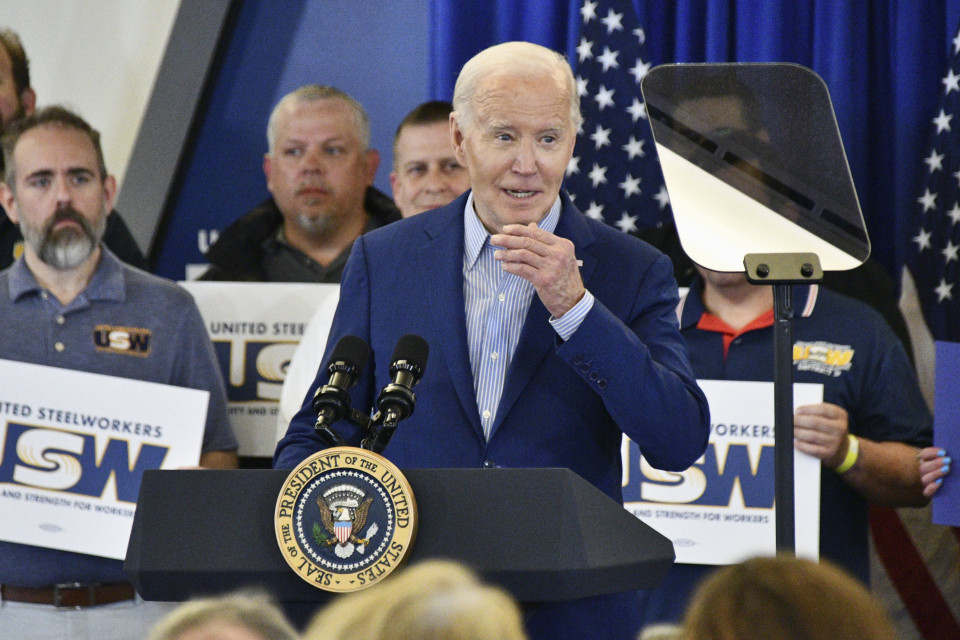U.S. President Joe Biden vowed Wednesday that United States Steel Corp. will remain "totally American" in his latest show of support for unionized workers who oppose Nippon Steel Corp.'s plan to acquire the producer.
"U.S. Steel has been an iconic American company for more than a century," Biden said, adding to loud applause it should be "American owned, American operated by American union steelworkers -- the best in the world. And that's going to happen, I promise you."
His speech in front of members of the powerful United Steelworkers union in Pittsburgh, Pennsylvania, came as the state is likely to play a decisive role in November's presidential election, as it has in the past.

Biden has close ties with labor unions. For the Democratic president, consolidating support from them is crucial for his hopes of defeating his predecessor and the presumptive Republican nominee Donald Trump, who has been ahead of the incumbent in some opinion polls.
The proposed merger, announced in December, was agreed to by U.S. Steel, and its shareholders last week overwhelmingly approved the $14.1 billion deal.
But the labor union, which endorsed Biden last month, is staunchly opposed to the Japanese company's planned acquisition of the U.S. steelmaker, also headquartered in Pittsburgh.
Trump has also said he would "block" Nippon Steel's plan as it has increasingly become a political issue.
It is highly unusual for a U.S. president to take a stance on such an agreement struck by private companies, especially given that a third-party review is believed to have already been carried out by the Committee on Foreign Investment in the United States.
The committee, known as CFIUS, is in charge of examining certain foreign investment transactions in U.S. firms and determining whether they pose national security threats.
After reiterating his stance on the U.S. company, Biden said his administration will seek to triple the tariff rate on steel and aluminum imports from China to more than 20 percent, in an attempt to protect American workers and deal with what it sees as "unfair" practices.
Currently, the average tariff rate on steel and aluminum products from China is 7.5 percent, according to the White House. Biden said he is asking the Office of the U.S. Trade Representative to consider tripling the rate under Section 301.
The section of the country's 1974 trade law authorizes the use of tariffs against a foreign country's allegedly unfair practices. It was a favorite tool of Trump to narrow trade deficits with China and other countries.
"Because Chinese steel companies produce a lot more steel than China needs, it ends up dumping the extra steel into the global markets at unfairly low prices," Biden said. "Chinese steel companies don't need to worry about making a profit, because the Chinese government is subsidizing them so heavily."
"They're not competing. They're cheating. They're cheating. And we've seen the damage here in America," he said, stressing also that he is not looking for a "fight with China" but "fair competition."
Among other measures, Biden is directing his team to block China's evasion of tariffs on such products coming from Mexico by cooperating with the neighboring country.
In a related development, the U.S. trade office said Wednesday that it has launched an investigation into Chinese practices and policies across the shipbuilding, logistics and maritime sectors.
China alone accounts for almost 50 percent of global steel output and its export prices are 40 percent lower than U.S. steel prices, according to a senior official who spoke on condition of anonymity.
However, the official added that Chinese steel imports account for only about 0.6 percent of total U.S. demand, so the potential inflationary impact of the tariff on the economy would be limited.
The announcement on seeking to hike the tariff rate is likely to draw a sharp reaction from China, which imposed retaliatory tariffs on U.S. exports during Trump's presidency.
Trump started introducing punitive duties against Chinese products in 2018.
The push to raise the existing tariff rate on steel and aluminum, which was lowered to 7.5 percent from 15 percent in February 2020, comes after the USTR office received a petition last month from the USW and four other powerful labor unions.
Related coverage:
U.S. seeks tripling of tariff rate on steel imports from China
Yellen says she thinks U.S. Steel should remain in American hands
U.S. court begins historic criminal trial of ex-President Trump
 By Takuya Karube,
By Takuya Karube,









